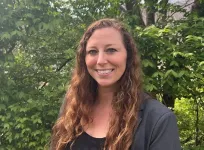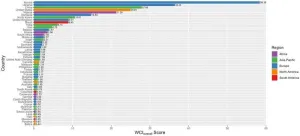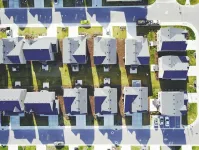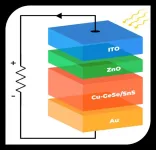New book helps citizen scientists navigate complexities of infectious disease outbreaks
2024-04-10
(Press-News.org) WASHINGTON (April 10, 2024) — Citizen scientists have long contributed to the collection and observation of natural events - from weather watchers to wildlife trackers – with thousands of organized community projects spanning decades. Beginning in 2020, the COVID-19 pandemic gave rise to an explosion of novice infectious disease detectives adding to the collection of science-enthusiasts.
To give these new disease detectives more tools for their craft, a new book written by two Georgetown University global health researchers, “Outbreak Atlas,” helps translate the complex interconnectedness of outbreak responses used by professionals across different fields, presenting accessible information that ensures a shared understanding of the essential activities to control an outbreak.
“We know there are thousands of people who have taken a keen interest in tracking outbreaks after living through the COVID-19 pandemic,” explains co-author Rebecca Katz, PhD, MPH, director of the Georgetown University Center for Global Health Science and Security (GHSS). “We hope our book helps lift the curtain on what goes on behind the scenes in the management of an outbreak including topics such as preparedness, response and recovery.”
The book translates the work of the Georgetown Outbreak Activity Library (GOAL), an interactive online tool for global health practitioners that Katz and Moore developed, that outlines what needs to be done, when, and by whom, throughout all phases of an outbreak – including preparedness, response, and recovery.
“GOAL helps guide professionals to be prepared for an outbreak and our book translates that information for a lay audience so they are empowered to be a part of this important work too,” Katz says.
“More than 100 case studies and the visuals we’ve included in the book give real world examples of outbreak management,” says co-author Mackenzie S. Moore, M.Sc., a scientist and global health researcher, a member of GHSS. “Outbreak Atlas contributes to the larger goal of increasing public health literacy in the general public. Successful outbreak response relies heavily on public support and community engagement, and we hope to equip citizen scientists with information that empowers them to make informed decisions that protect themselves, their friends, and their families..”
“Outbreak Atlas"will be available for purchase at online retailers beginning April 15.
###
END
ELSE PRESS RELEASES FROM THIS DATE:
2024-04-10
A University of Tennessee Extension specialist has been selected to assist land-grant university teams implementing grants through the Extension Collaboration on Immunization Teaching and Engagement (EXCITE), a national effort to encourage adult vaccinations in rural areas and among underserved communities.
Laura Clark, UT Extension state specialist in family and consumer sciences, will serve as a national EXCITE Bridge Grant coach and work with six land-grant universities that are grant recipients through the program. Clark has worked for UT Extension for six years, ...
2024-04-10
A country’s economic prosperity is linked with improved well-being in its residents, according to a study published April 10, 2024 in the open-access journal PLOS ONE by Feng Huang from the Chinese Academy of Sciences, and colleagues.
Philosophers have long pondered the fraught relationship between money and happiness. Aristotle and Solon argued against the euphoric powers of wealth, while the Easterlin Paradox suggests that a nation’s economic fortitude can influence its residents’ health and happiness. Little evidence exists to support this claim in China, especially after the country’s recent economic expansion and rapid industrialization.
Huang and colleagues ...
2024-04-10
A newly developed World Cybercrime Index shows that most cybercriminal threats are concentrated in several countries, with different countries associated with distinct cybercrime types. Miranda Bruce (University of Oxford/University of New South Wales), Jonathan Lusthaus (University of Oxford), Ridhi Kashyap (University of Oxford), Nigel Phair (Monash University), and Federico Varese (Sciences Po) present these findings in the open-access journal PLOS ONE on April 10, 2024.
Worldwide, cybercrimes are estimated to cost hundreds ...
2024-04-10
An analysis of building footprints in major US metropolitan areas identifies five different neighborhood types that vary in footprint size, shape, and placement, and which are statistically associated with varying neighborhood socioeconomic and demographic traits. Noah Durst of Michigan State University, US, and colleagues present these findings in the open-access journal PLOS ONE on April 10, 2024.
People have long studied the shape and placement of human settlements—“neighborhood morphology”—to help inform urban planning and management. Recent technological advancements, such as high-resolution satellite imagery and more powerful computational ...
2024-04-10
Indigenous Australian message sticks, which feature markings to convey messages over long distances, analyzed for first time at scale through new database of 1,500 artifacts
###
Article URL: https://journals.plos.org/plosone/article?id=10.1371/journal.pone.0299712
Article Title: AMSD: The Australian Message Stick Database
Author Countries: Australia, Germany
Funding: The lead author (Piers Kelly) receives salary and project funding specifically for the research described in this paper. He is funded by an ARC Discovery Early Career Researcher ...
2024-04-10
What we eat can impact our health as well as the environment. Many studies have looked at the impacts of diets in very general terms focused at the level of food groups. A new study led by researchers at the University of Tokyo explores this issue following a more nuanced dish-level approach. One of the benefits of this kind of study is that people’s connections with their diets vary around the world and have strong cultural associations. Knowledge of the impacts of diets using dishes rather than broad food groups can help individuals make informed choices and those in the food industry improve ...
2024-04-10
Researchers from Lehigh University have developed a material that demonstrates the potential for drastically increasing the efficiency of solar panels.
A prototype using the material as the active layer in a solar cell exhibits an average photovoltaic absorption of 80%, a high generation rate of photoexcited carriers, and an external quantum efficiency (EQE) up to an unprecedented 190%—a measure that far exceeds the theoretical Shockley-Queisser efficiency limit for silicon-based materials and pushes the field of quantum materials for photovoltaics to ...
2024-04-10
The gut microbiome has a profound impact on the health and development of infants. Research shows that dysbiosis—or imbalances in the microbial community—is associated with gastrointestinal diseases and neurodevelopmental deficits. Understanding how gut bacteria interact, and how these interactions may lead to some of these problems, however, is difficult and time consuming through traditional laboratory experiments.
Researchers at the University of Chicago have developed a new generative artificial intelligence (AI) tool that models the infant microbiome. This “digital ...
2024-04-10
Following three years of intensive research, an international team of researchers have compiled the first ever ‘World Cybercrime Index’, which identifies the globe’s key cybercrime hotspots by ranking the most significant sources of cybercrime at a national level.
The Index, published today in the journal PLOS ONE, shows that a relatively small number of countries house the greatest cybercriminal threat. Russia tops the list, followed by Ukraine, China, the USA, Nigeria, and Romania. The UK comes in at number eight.
Co-author of the study, Dr Miranda Bruce from the ...
2024-04-10
A new lab assay developed by researchers at Fred Hutch Cancer Center could make diagnosis and treatment of small-cell lung cancer and non-small cell lung cancer easier.
The blood-based test, also called a “liquid biopsy,” can detect differences between types of lung cancer by examining patterns in cell-free tumor DNA in blood samples. It’s a desirable option for detecting small-cell lung cancer (SCLC) as standard needle biopsies fail due the number of smaller tumors typically present and the variety of tumor subtypes that indicate different treatment pathways.
“There ...
LAST 30 PRESS RELEASES:
[Press-News.org] New book helps citizen scientists navigate complexities of infectious disease outbreaks






